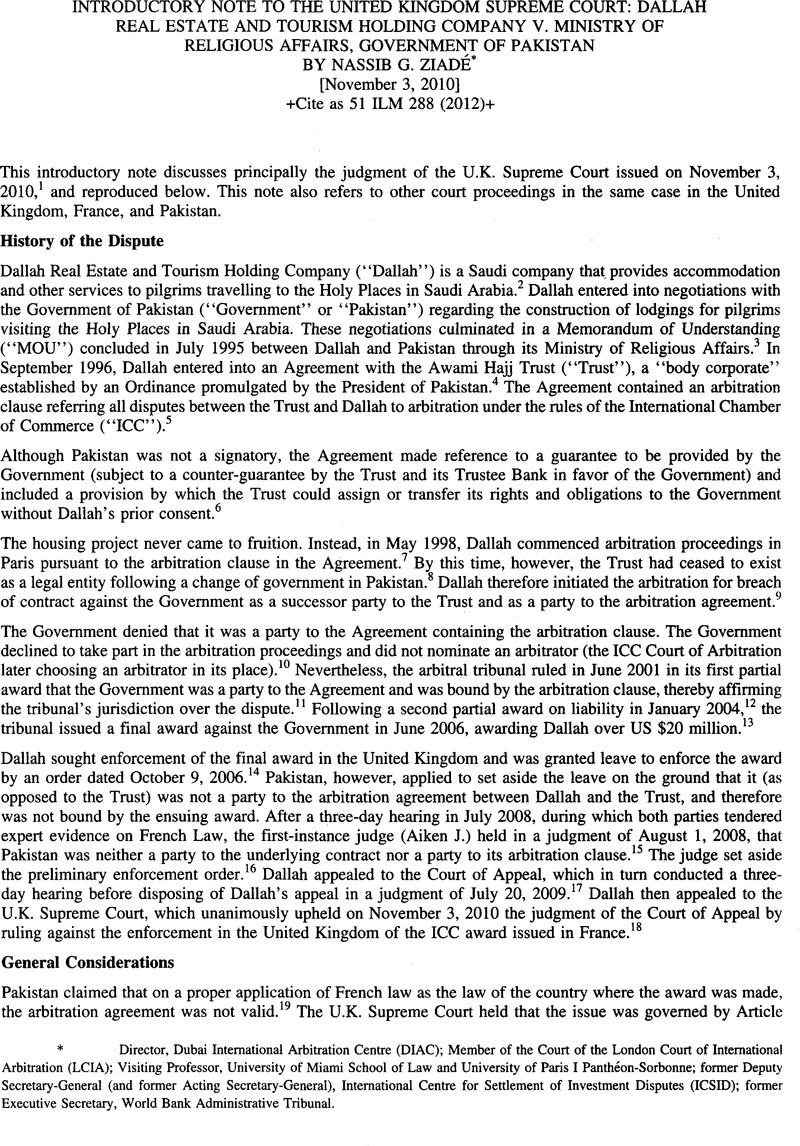Published online by Cambridge University Press: 27 February 2017

* This text was reproduced and reformatted from the text available at the U.K. Supreme Court website (visited Mar. 21, 2012) <http://www.supremecourt.gov.uk/decided-cases/docsAJKSC_2009_0165_Judgment.pdf.>
1 Dallah Real Estate & Tourism Holding Co. v. Ministry of Religious Affairs, Gov. of Pakistan, [2010] UKSC 46 (Nov. 3) [hereinafter Supreme Court Judgment].
2 Id. ¶ 3.
3 Id.
4 Id. ¶¶ 4, 7, 135.
5 Id. ¶ 1.
6 Id.
7 Id. ¶ 9. A series of suits was brought in the courts of Pakistan in the name of either the Trust or the Government, both before and after the commencement of the arbitration proceedings. None of these suits produced a judgment on the merits. Id. ¶¶ 47-53.
8 Id. ¶ 8.
9 Id. ¶ 9.
10 Id. The arbitral tribunal comprised Dr. Ghaleb Mahmassani (Chair), Lord Mustill, and Dr. Nassim Hasan Shah.
11 Id. ¶¶ 2, 9, 154.
12 Id. ¶ 9.
13 Id. ¶ 1, 9, 151.
14 Id. ¶ 10.
15 Dallah Real Estate & Tourism Holding Co. v. Ministry of Religious Affairs, Gov. of Pakistan, English High Court (Aug. 1, 2008).
16 Supreme Court Judgment, ¶¶ 10, 156.
17 Dallah Real Estate & Tourism Holding Co. v. Ministry of Religious Affairs, Gov. of Pakistan, English Court of Appeal (July 20, 2009). Supreme Court Judgment, ¶ 10.
18 Id. ¶¶ 70-71, 149, 162-63. The bulk of the November 3,2010 judgment was authored by Lord Mance and Lord Collins, and was endorsed by the other members of the Supreme Court, namely Lords Hope, Saville, and Clarke.
19 Id. ¶ 72.
20 Id. ¶ 12, 75-76.
21 Id. ¶ 77.
22 Id. ¶ 12, 30.
23 Id. ¶ 30.
24 Id. ¶ 21.
25 Id. ¶ 99.
26 Id.
27 Id. ¶¶ 21, 99.
28 Id. ¶ 84.
29 Id.
30 Id. ¶ 86.
31 Id.
32 Id. ¶ 101.
33 Id. ¶ 30.
34 Id. ¶ 160.
35 Id. ¶ 31.
36 Id. ¶ 101.
37 Id. ¶ 102.
38 Id. ¶ 104.
39 Id. ¶ 160.
40 Id. ¶ 20-21.
41 Id. ¶ 23.
42 Id. ¶ 103.
43 Id. ¶ 23.
44 ld. ¶ 27.
45 Id. ¶ 67.
46 Id. ¶ 68.
47 Id. ¶ 128.
48 Id. ¶ 131.
49 id.
50 Failing any indication by the parties as to the law governing the arbitration agreement, French law (as the law of the country where the award had been made) was deemed applicable, pursuant to Article V(l)(a) of the New York Convention. Id. ¶¶ 15, 72, 78.
51 Id. ¶¶ 14-15, 110. In the words of Lord Collins, “[w]hat French law does is to draw a distinction between domestic arbitrations in France, and international arbitrations in France. It applies certain rules to the former, and what it describes as transnational law or rules to the latter.” Id. ¶ 124.
52 Id. ¶¶ 17, 118. Lord Mance and Lord Collins referred to the following statement agreed upon by the two experts respectively appointed by the parties: “Under French Law, in order to determine whether an arbitration clause upon which the jurisdiction of an arbitral tribunal is founded extends to a person who is neither a named party nor a signatory to the underlying agreement containing that clause, it is necessary to find out whether all the parties to the arbitration proceedings, including that person, had the common intention (whether express or implied) to be bound by the said agreement and, as a result, by the arbitration clause therein. The existence of a common intention of the parties is determined in the light of the facts of the case. To this effect, the courts will consider the involvement and behaviour of all the parties during the negotiation, performance and, if applicable, termination of the underlying agreement.” Id. ¶¶ 17, 119.
53 Id. ¶¶ 19, 122.
54 Id. ¶¶ 32-65.
55 Id. ¶¶ 66.
56 Id. ¶ 36.
57 Id. ¶ 40.
58 Id. ¶ 145.
59 Id. ¶ 10. On August 19, 2009, Dallah had filed an application in the French courts for enforcement of the final award.
60 Gouvernement du Pakistan-Ministère des affaires religieuses v. Société Dallah Real Estate and Tourism Holding Co., Paris Court of Appeal (Feb. 17, 2011).
61 Translation by author. The original reads as follows: “[L]e Gouvernement [du Pakistan] s’est comporté comme si le Contrat était le sien;... cette implication du Gouvernement [du Pakistan], sans qu’il soit fait état d’actes accomplis par le Trust, comme son comportement lors des négociations précontractuelles confirment que la création du Trust était purement formelle, et que le Gouvernement du Pakistan ... comme Dallah en convenait s’est comporté comme la véritable partie pakistanaise lors de l’opération économique.”
62 Supreme Court Judgment, 118.